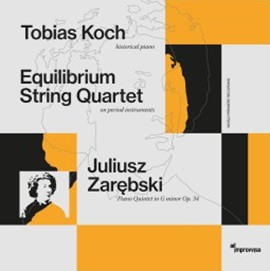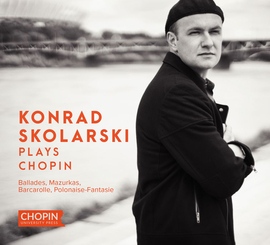Konrad Skolarski beginnt die g-Moll-Ballade mit ergreifendem Schmerz. Doch den Ausbruch von Revolte, der folgt, verliert sich in wohl ganz aparten, aber hier nicht zweckdienlichen Artikulierungen der Akkorde. Also keine Revolte, dafür aber brillant-virtuoses Spiel, in dem alles Aufgewühlte außen vor bleibt.
Die zweite Ballade wird anfangs sehr verhalten und ruhig gespielt, was den Kontrast zu dem folgenden, virtuosen Ausbruch schärft, wie dann auch die ganze Ballade sehr kontrastreich wird und von diesen Kontrasten Kraft und Expressivität erlangt, Die beiden anderen Balladen werden ebenfalls sehr ausdrucksvoll und narrativ gespielt.
Ganz besonders schön sind die Mazurken, die Barcarolle und das abschließende Prélude. Eine Charakteristik der Interpretation ist eine auf Ökonomie bedachte Grundeinstellung: Ökonomie der Gesten, Ökonomie der Akzente, wenig Ausschweifendes also, dafür alles stärker gebunden ans Herz. Das Träumerische, das Schmerzliche ohne jede Bitterkeit, das Ernsthafte, die Melancholie, das sind die Stimmungen, denen Skolarski nachspürt, mit Sinn für Poesie, mit Noblesse, ohne den geringsten Anflug von Sentimentalismus.
Konrad Skolarski begins the G minor ballad with poignant pain. However, the subsequent outbreak of rebellion is overshadowed by unusual and, in this context, very special articulations. There is no rebellion; instead, there is brilliant, virtuoso playing, without any turmoil. The second ballad begins with restraint and calm, which sharpens the contrast with the virtuoso outburst that follows. The ballad becomes rich in contrast, gaining power and expressiveness from these contrasts. The other two ballads are also played expressively and narratively.
The mazurkas, barcarolle, and concluding prelude are particularly beautiful. A characteristic of the interpretation is a frugal attitude: frugal gestures, frugal accents, little extravagance, and a stronger emotional connection. Dreamy, painful (without bitterness), serious, and melancholy are the moods that Skolarski explores with poetry and nobility, without the slightest hint of sentimentality.























